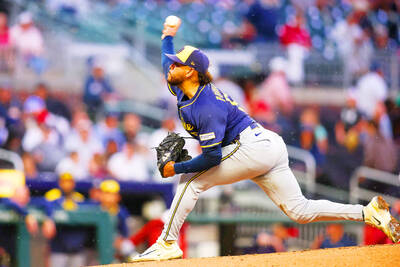With just over a week to go before the start of the this year’s Australian Football League Women’s (AFLW) season, elite Brisbane Lions forward Jess Wuetschner took to social media to call for calm among some disgruntled AFLW fans.
“Although there has been little to no media or promoting of the AFLW season, just know that we all have faith that the incredible fans from last year and more will turn out in spades and support us in the 2018 season,” she wrote.
On Friday, with the specter of last year’s emotional, riotous debut looming large, all talk centered on the question of a lockout — to the extent that the game’s perceived success appeared to hinge on whether the lockout would repeat. By just after 5pm, with still a full half hour to go before gates opened, all signs were that a repeat would ensue.
Lines of hundreds snaked outside Princes Park in Carlton, Victoria, while still more stood in full sun to collect their Brianna Davey bobblehead. Girls took turns at the Hyundai handball bullseye, while a Chemist Warehouse BBQ sizzled nearby.
The clear message was: get in early or risk missing out.
As banners were held aloft as the clock ticked past 7:30pm, they too referenced a lockout.
“The Magpies are back/The crowd’s up and about/At half time they’ll be asking/If the Blues [Carlton Football Club] were locked out,” was the cocky effort from a Collingwood cheer squad fresh off a 35-point hiding from this time last year.
“The nation was watching/We filled every seat/(Let’s not forget the result)/& let history repeat,” was the Blues’ retort, on the contrary keen to keep the football result — so often secondary in accounts of that night — in mind.
However, as those banners were torn and Sherrins kicked into twilight air, it became apparent that the numbers of last year were not quite there.
Make no mistake — the fanatical fans of last year returned, but more did not necessarily return in spades. The final crowd figure, officially 19,852, was high enough to be a victory for women’s football, while at the same time falling just shy enough of 20,000 to be a disappointment for those most invested in the game.
However, the biggest mistake would be to take that as a failure of the women’s game. As Wuetschner made clear, the promotion of AFLW season two has fallen well short of public expectation.
In that sense it could not be more unlike season one, which, for all you could say about the AFL, was given more than its fair share of marketing, but, during two weeks in which The Seven Newtwork commanded almost unilateral attention during the Australian Open, the AFLW was all but ignored in favor of this year’s Winter Olympics in South Korea or other non-sport-related content.
Perhaps Seven had by then made the decision to leave most of the AFLW coverage to Foxtel, or its subsidiary channel in 7Mate.
Perhaps it was being dictated to by the AFL, itself deciding to introduce the notoriously unpopular AFLX (a seven-a-side variation of Australian rules football) into a section of the season it had supposedly reserved for women’s football (justifying its being played in mid-summer).
Whatever the reason, it and the AFL’s radio silence on the subject seemed to make little sense given how passionately the first season was received, and the clear grassroots momentum behind women’s sport that the AFL has unwittingly tapped into with the emergence of AFLW.
Viewed in this light, the 19,852 was a serious feat indeed; healthy evidence of the rebellious, backs-to-the-wall instinct that women’s football is synonymous with.
Wuetschner’s call for faith is one situated in that history; one patient and persistent enough to have fought relentlessly for this moment for more than a century.
From an on-field perspective, all the signs were there that the competition’s future is a healthy one, and that the quality will continue to improve with every advancement toward its further professionalization.
Collingwood, in the off-season admitting to “over-complicating” things in the inaugural season, ran and carried the ball with a fluency absent from season one, led by captain Steph Chiocci and star-in-the-making Chloe Molloy who showed a composure well-beyond her years to regularly hit-up opponents under pressure.
For an ultimately-cleaner Carlton, Darcy Vescio eschewed the heroics of last year to play the percentages and center balls when the crowd screamed for her to blaze at goal instead.
In a warning to rival teams, she combined effectively with new recruit Tayla Harris in a forward set-up that should be feared.
Harris, who upset ex-Lions teammates earlier in the week by calling Brisbane “chilled” in comparison to her more “professional” destination in Carlton, was the story of the night, dominating aerially and showing no hint of her trademark indifferent form.
In this sense she played in the mold of most intra-club recruits; eager to impress and likely to — according to the pessimistic Blues faithful — later disappoint.
In full flight, she was impossible to ignore, and for Brisbane fans perhaps, easy to dislike.
The same could be said for Sarah D’Arcy, who, despite earning plenty of plaudits for her courageous first year, earned the ire of many more with a boot to the groin of opponent Sarah Hosking — with a report and boos from Carlton fans following.
If the end goal is that the AFLW is treated (mostly) as the men’s game is treated (as a sport and otherwise unremarkable), then these were the most indicative signs of a game matured.
While last year’s largely neutral crowd cheered every display of skill, courage and conviction, this year’s was more typically parochial.
As the siren sounded on another, much closer Carlton win, fans (with a notable majority girls and women) streamed on to the field for kick-to-kick in another reminder of what makes women’s football unique.
Unlike AFL, AFLW still has a community feel, and that 19,852 would turn out despite barely a word from the organizers was testament to the grassroots support and passionate following it enjoys. Their presence for the beginning of AFLW season two served as a reminder that once arrived, AFLW will not be going anywhere.

Jobe Bellingham on Tuesday admitted to having “anxieties” on following in brother Jude’s footsteps after joining Borussia Dortmund in the summer. Jobe Bellingham, 19, is two years younger than Jude Bellingham, who joined Real Madrid in 2023 after three years at Dortmund. A centerpiece of the England national team, Jude Bellingham has emerged as one of the best players in the world in recent seasons. The younger Jobe Bellingham joined Dortmund in June from Sunderland after their promotion to the English Premier League. He admitted he understood what the perception would be ahead of the move to Germany. “It’s something you do think about.

Before Tuesday’s 7-2 win at the Atlanta Braves, Milwaukee Brewers manager Pat Murphy suggested “most people couldn’t tell you five players on our team.” A look at the standings would indicate more Brewers players soon will be recognized by more fans. After all, it is difficult to overlook a team that not only continues to extend their lead in the National League Central, but also boasts the best record in the majors. “What we’re doing in here right now is special,” right-handed pitcher Freddy Peralta said after allowing only four hits and one run in five innings, while setting a career high with

A baseball team from New Taipei City won the US Pony Palomino Division World Series yesterday in Laredo, Texas, defeating the US West representative team from Azusa, California, 2-1. Ku-Pao Home Economics and Commercial High School earned the right to represent Taiwan in the Pony Palomino (17 to 18 age group) World Series after winning this year's Wang Chen-chih Cup, a competition named after Taiwanese-Japanese baseball legend Wang Chen-chih (王貞治), also known as Sadaharu Oh. In the championship game against Azusa, Ku-Pao's starting pitcher Luo Yu-yan (羅于晏) was erratic early, giving up two hits in the bottom of the first inning, followed

Taiwanese pitcher Teng Kai-wei took the mound in New York on Saturday as the starting pitcher for the San Francisco Giants in his MLB season debut against the New York Mets, pitching 3.1 innings and allowing five runs. The Taiwanese right-hander struggled early, giving up three runs in the bottom of the first inning, including a three-run homer to Mets slugger Pete Alonso — his 250th career home run. However, Teng was not fazed and soon found his footing, holding the Mets scoreless in the bottom of the second and third innings. Meanwhile, Mets starter Kodai Senga of Japan made a few errors